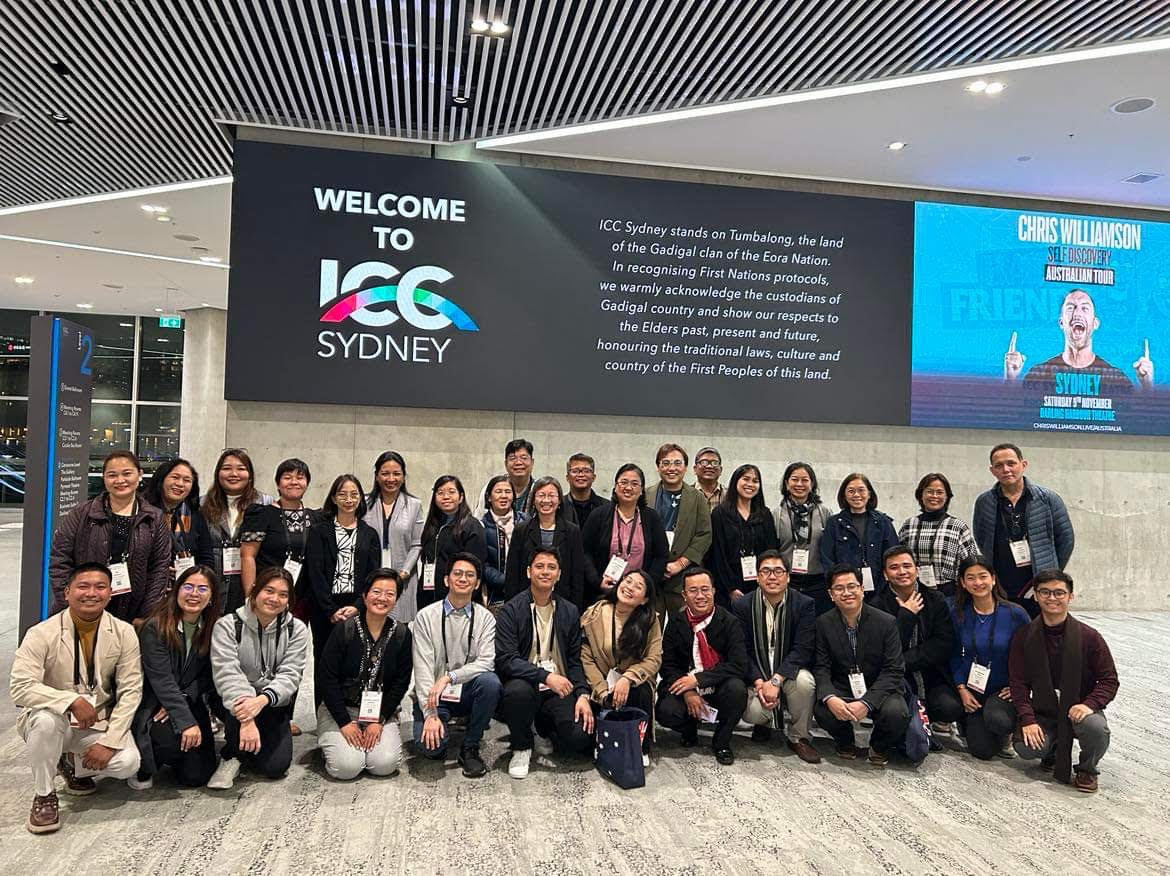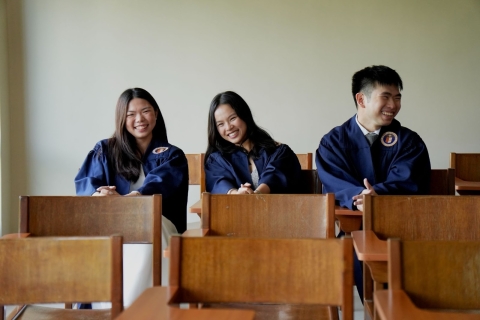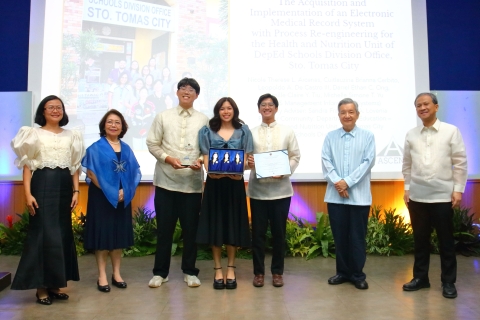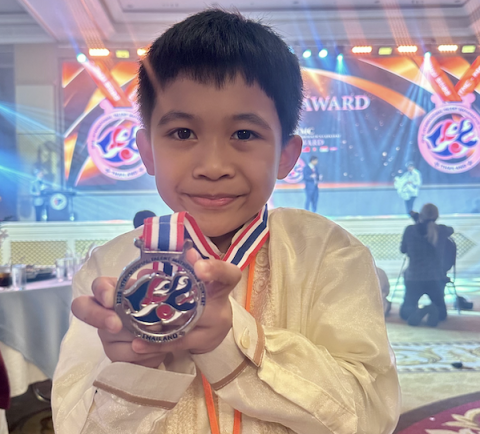Forging academic frontiers: MathEd eagles soar at ICME-15
13 Aug 2024 | Jake B Garnace (PhD Math Ed)
At the heart of Australia’s winter, in the traditional lands of the Gadigal People of the Eora Nation, 18 faculty and students from the Department of Mathematics, School of Science and Engineering, Ateneo de Manila University – the MathEd Eagles – joined thousands of mathematics education scholars and researchers in a week-long journey of academic exploration, intellectual stimulation, and networking opportunities. The venue was the International Convention Centre (ICC) in Sydney, New South Wales, Australia where the 15th International Congress on Mathematical Education (ICME-15) was held from 7-14 July 2024. ICME, which takes place every four years, is by far the largest gathering of mathematics educators from around the globe organized under the auspices of the International Commission on Mathematical Instruction (ICMI). With the theme, “Come and be counted,” ICME-15 aimed at addressing geographic, economic, technological, and other forms of disadvantages and divides in the teaching and learning of mathematics. The congress also focused on mathematics education topics that included assessment practices, pedagogical approaches, discussions on curriculum development, integration of indigenous knowledge in the curricula, technology-assisted learning, and collaborations that build networks of mathematics educators and learners. Other related topics were also covered: undergraduate teaching of mathematics and statistics; Indigenous mathematical knowledge that informs global efforts in mathematics education; and the impact of teachers’ work and of facilitating and supporting people-to-people connections in classrooms.
The Early Career Research (ECR) Program, held on July 7 prior to the actual Congress aimed to enhance the research skills of early career researchers across diverse sub-disciplines in mathematics education, facilitate collaboration with international experts, and foster networking opportunities to expand their professional connections. Three MathEd Eagles joined the ECR Program. Mr Nhoriel I Toledo, a PhD Mathematics Education student shared that the ECR Program provided the much-needed clarification on research methods and principles as well as on publications, boosting his motivation to delve deeper into mathematics education research. “Overall, the Early Career Researcher Day provided a comprehensive and enriching experience. It not only offered valuable knowledge but also fostered a sense of community among aspiring researchers like [me]. I left the event feeling motivated, informed, and well-equipped to [continue] my journey in mathematics education research,” Toledo said.
The grandiose ICC Grand Ballroom housed the Welcome Reception on July 7 where some delegates enjoyed the steaming cups of Australian coffees and teas, while others buoyed their conversations over fine wines and some hors d'oeuvres. The atmosphere was filled with excitement and awe as researchers happily met old friends, colleagues, acquaintances, and their “idols” in their respective research niches, who have inspired and guided them in their research pursuits. ICME-15 was the first onsite congress in eight years because of the untimely interference of the COVID-19 pandemic at ICME-14 in 2020.
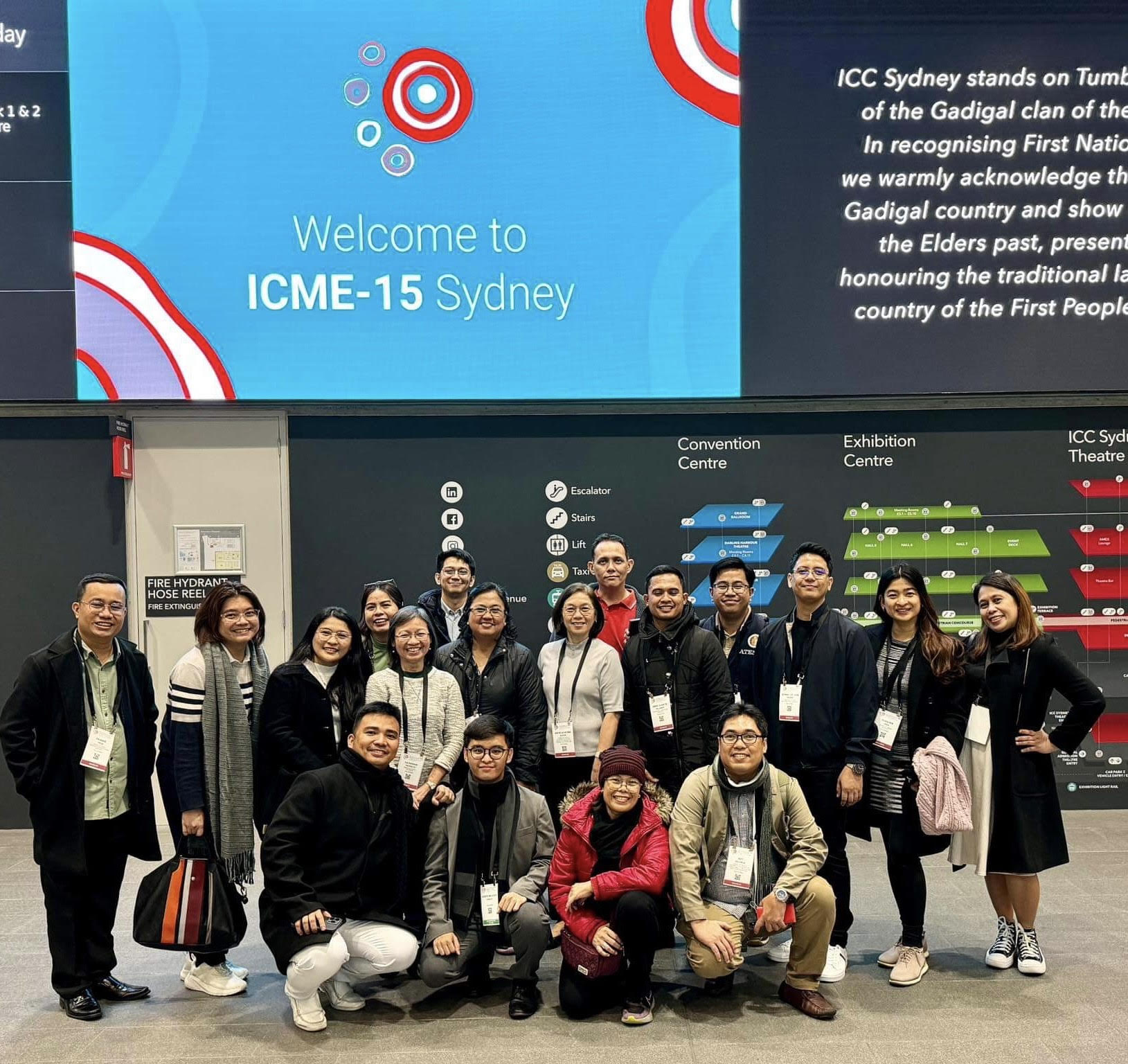
The crisp of 15℃ winter breeze greeted and welcomed the delegates on July 8 for the Opening Ceremonies at the Darling Harbour Theatre, ICC. With 2,322 delegates from 97 countries, witnessing the Welcome to Country ceremony and ritual that is uniquely Australian, and messages from ICMI, the ICME-15 Local Organizing Committee, and officials of various Australian organizations greeting the Congress participants, the excitement and anticipation inside the theater were palpable. “I love Mathematics… It is a language that brings communities together and it is the foundation of all learning,” quipped Professor Merlin Crossley during the opening ceremony. Crossley, Vice Chancellor for Academic Quality of the University of New South Wales reiterated the importance of a strong mathematics education from across the world.
Three mathematics educators were given prestigious awards during the opening ceremony of the congress. The Felix Klein Award, honoring his lifetime achievement in mathematics education, was awarded to Ferdinando Arzarello. The Hans Freudenthal Award, which recognizes a major cumulative program of mathematics education research was awarded to Ole Skovsmose. Lastly, the Emma Castelnuovo Awards, recognizing outstanding practices in mathematics education, was awarded to Kaye Stacey.
As with all ICMEs, ICME-15 offered an attractive smorgasbord of scholarly activities and a few organized social engagements. The scientific program offered four plenary lectures and two plenary panels, three awardee lectures, four survey reports, one report on ICMI studies, 54 topic study groups (TSG), 30 discussion groups (DG), 70 workshops, and five (5) national presentations. The social activities included a Welcome Reception on the evening of July 7, organized excursions on July 11, and daily morning and afternoon tea.
Five national presentations from Cambodia, Kenya, Lithuania, New Zealand, and Tunisia cited the countries’ challenges and achievements in mathematics education. Cambodia’s presentation highlighted the 2013 education reform, which introduced curriculum updates, new textbooks, and a focus on 21st-century skills to enhance teaching and STEM education. However, challenges like school and teacher shortages, inadequate training, and low wages persist. Kenyan colleagues discussed the shift to a Competency-Based Curriculum and the growth of higher education institutions over the past 15 years, along with challenges in low-resource settings and the need for international research collaboration. The Aotearoa/New Zealand presentation addressed the impact of colonization and Eurocentric systems on Indigenous Māori and Pacific peoples, emphasizing the integration of Indigenous knowledge and social justice in mathematics education. Finally, Tunisian representatives reviewed five major curriculum reforms since 1956, noting shifts in focus and persistent issues with teaching mathematical integration, suggesting future reforms should better align with students' conceptual understanding.
The MathEd Eagles showcased their research outputs in the TSGs, contributing significantly to the body of knowledge in mathematics education research. To name a few, the MathEd Eagles shared the results of their research undertaking in the areas of mathematical creativity in the classrooms, teacher professional development frameworks, theories to aid calculus learning, mathematical thinking processes of students through eye-tracking, and linguistic interdependence and linguistic relativity in mathematical thinking. Moreover, they had opportunities to share significant insights about the issues, challenges, and controversies that interest the international and regional delegates alike.
In an interview, Mr Frankie A Fran, a PhD in Mathematics Education student, shared that he was overwhelmed to have met and interacted with the experts in the field of ethnomathematics. He said that he was amazed by the experts’ acknowledgment of his ongoing research undertaking on the Sociocultural Mathematization of the Inherent Mathematical Knowledge Systems and Practices of the Sibuyan Mangyan Tagabukid. “The participants in my TSG have shown interest and passion [in] what I am trying to pursue in our early conversations. They have also offered help with my dissertation – which is technically, in my opinion, one of the reasons why ICME exists” Fran stated.
In addition to attending the TSGs and DGs, the delegates also delighted themselves with the exciting excursions offered by the congress. Against the backdrop of the breathtaking Australian skies, the MathEd Eagles visited the majestic Sydney Opera House, overlooking the iconic Sydney Harbour Bridge, while others enjoyed themselves in a unique tribal cruise that featured the rich heritage and tradition of the Aborigines, Australia’s First Nation People. Some of the Eagles relished the serenity and tranquility of the Chinese Garden of Friendship, while the rest explored the academic grounds of the University of Sydney.
During the closing program of the congress on July 14, Professor Kim Beswick, the ICME-15 Convenor expressed her feelings of relief on the successful conduct of the congress. She challenged the delegates to continue the influence of the ICME -15 – that the things heard and talked about, and the connections made will influence what happens after going back to their respective countries. “We want the students’ experiences of learning mathematics to be better as a result of ICME-15,” Beswick said.
In closing, Professor Nad’a Vondrova, the Chair of the Scientific Committee, together with the Local Organizing Committee Chairs David Janda and Ladislav Kvasz, invited the delegates to join ICME-16, which will be held in Prague, Czech Republic in 2028.
To wrap up the MathEd Eagles’ incredible ICME-15 journey, a debriefing session was held on July 14 where they shared their overall experiences and impressions of the congress.
“The experience here is fruitful and a productive one especially that I got to meet the giants in mathematical modeling. Meeting them in person, I feel so privileged,” said Jimbo Juanito Villamor, a PhD Mathematics Education candidate.
“It’s always validating when other experts give comments about your work,” Dr Lester C Hao, a faculty member of the Ateneo Math Department added.
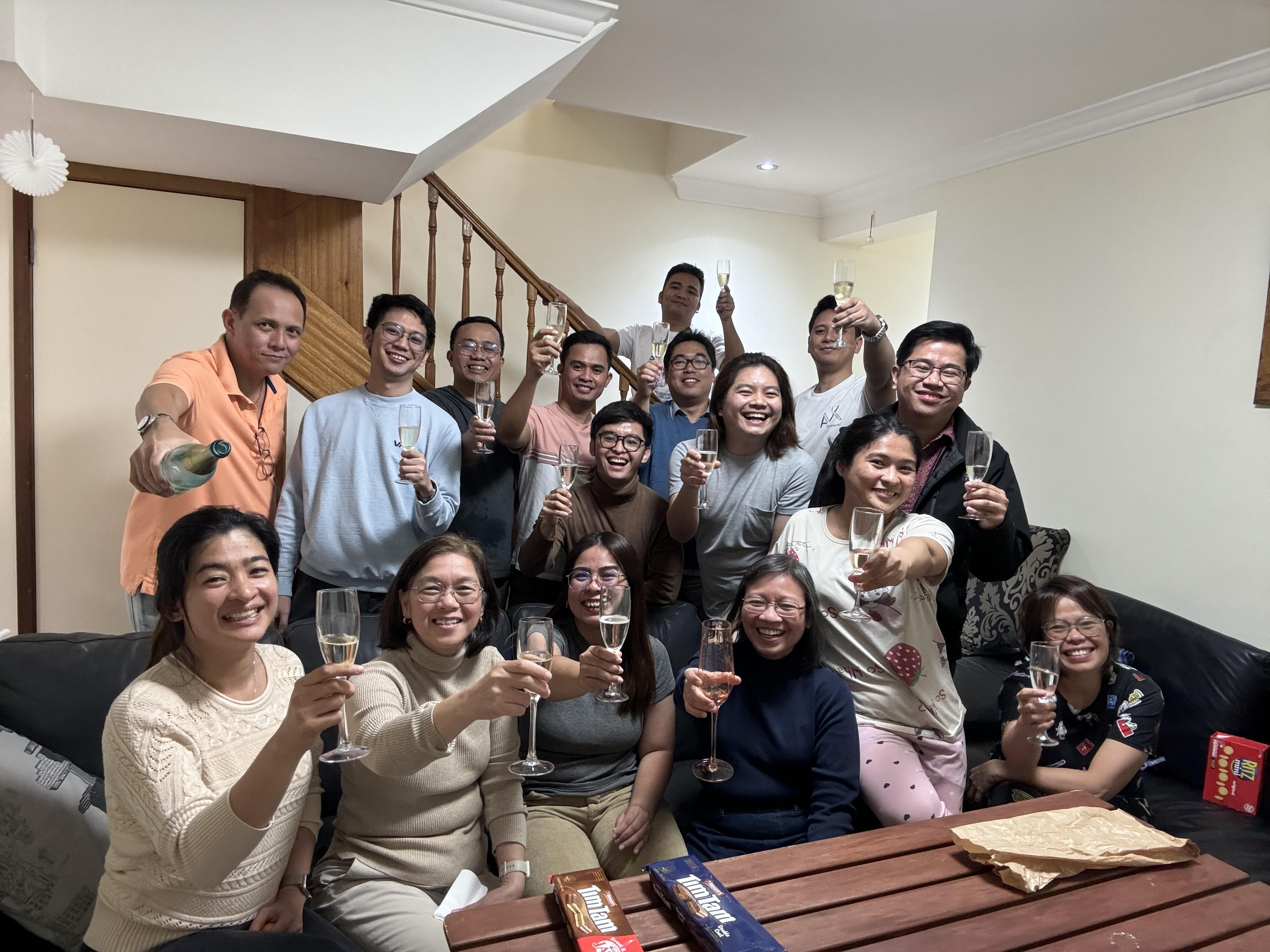
With the next ICME happening in 2028, all 18 delegates from the Department of Mathematics anticipate the next four years to be a busy time for producing new research and look forward to their active participation at ICME-16 in the beautiful city of Prague.
